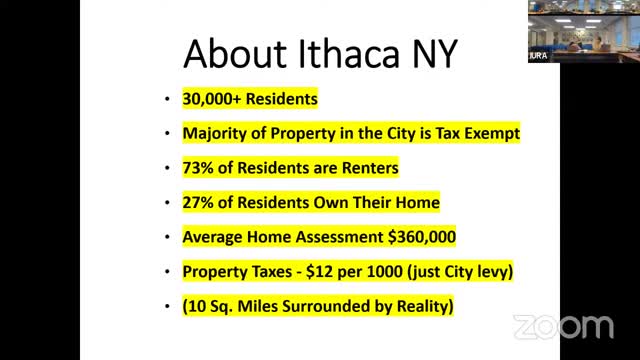City launches revolutionary program to fix crumbling sidewalks
July 13, 2024 | Ithaca City, Tompkins County, New York

This article was created by AI summarizing key points discussed. AI makes mistakes, so for full details and context, please refer to the video of the full meeting. Please report any errors so we can fix them. Report an error »

In a recent government meeting, officials discussed the ongoing challenges and solutions related to the city's sidewalk infrastructure, highlighting a significant shift in policy aimed at alleviating the financial burden on property owners. Currently, only 27% of residents own their homes, with many renters facing high property taxes and assessments. The city has recognized the need to support its walking population, which comprises 27.7% of commuters, by improving sidewalk conditions.
Ten years ago, a staggering 80% of the city's sidewalks were either condemned or in disrepair. The previous system required homeowners to bear the full cost of sidewalk repairs, often leading to expenses exceeding $20,000 for corner properties. This financial strain, coupled with inadequate compliance with the Americans with Disabilities Act (ADA), prompted the city to seek a more equitable solution.
The new approach aims to address these issues by providing tax-exempt property options for sidewalk repairs, thereby reducing the financial impact on small property owners. The median cost of sidewalk repairs has doubled over the past decade, now averaging around $2,000 for typical residential frontages. Additionally, the city estimates that approximately 47 miles of sidewalks are still missing from its streets, further underscoring the need for comprehensive infrastructure improvements.
Officials emphasized the importance of creating accessible and safe walking environments for all residents, particularly those with mobility challenges. The meeting underscored a commitment to enhancing the city's infrastructure while balancing the financial realities faced by property owners.
Ten years ago, a staggering 80% of the city's sidewalks were either condemned or in disrepair. The previous system required homeowners to bear the full cost of sidewalk repairs, often leading to expenses exceeding $20,000 for corner properties. This financial strain, coupled with inadequate compliance with the Americans with Disabilities Act (ADA), prompted the city to seek a more equitable solution.
The new approach aims to address these issues by providing tax-exempt property options for sidewalk repairs, thereby reducing the financial impact on small property owners. The median cost of sidewalk repairs has doubled over the past decade, now averaging around $2,000 for typical residential frontages. Additionally, the city estimates that approximately 47 miles of sidewalks are still missing from its streets, further underscoring the need for comprehensive infrastructure improvements.
Officials emphasized the importance of creating accessible and safe walking environments for all residents, particularly those with mobility challenges. The meeting underscored a commitment to enhancing the city's infrastructure while balancing the financial realities faced by property owners.
View full meeting
This article is based on a recent meeting—watch the full video and explore the complete transcript for deeper insights into the discussion.
View full meeting
